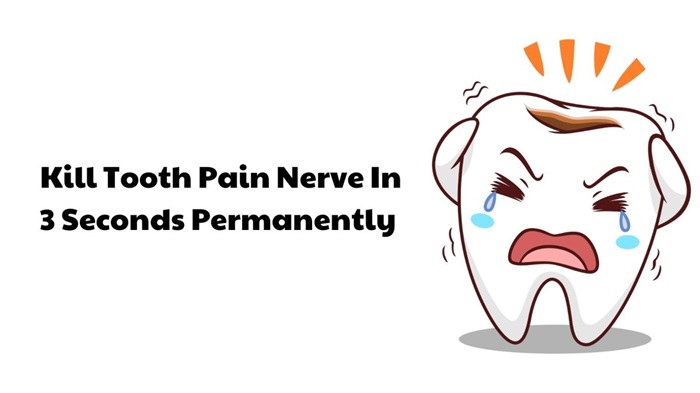Kill tooth pain nerve in 3 seconds permanently with these effective relief methods, let’s learn something healthy.
Tooth pain can strike suddenly and disrupt your daily life, leaving you in extreme distress. While the notion of killing tooth pain nerve in 3 seconds permanently might sound appealing, it’s crucial to understand that such an immediate and permanent solution is not realistically achievable. Instead, this guide will explore the effective methods to manage tooth pain, including both immediate relief and long-term solutions.
Understanding Tooth Pain and Its Causes
Before diving into how to kill tooth pain nerve in 3 seconds permanently, it’s important to understand the nature of tooth pain. Tooth pain often originates from the nerves within the tooth, which can become inflamed or irritated due to various reasons. Common causes of tooth pain include:
- Tooth Decay: Damage to the tooth structure that exposes the nerves.
- Worn Out Fillings: Old or damaged fillings can lead to nerve exposure.
- Periodontitis: Gum disease that affects the tooth roots and nerves.
- Exposed Root Canal: When the root canal becomes exposed, it can cause severe pain.
- Worn Tooth Enamel: Erosion of enamel that exposes the dentin and nerves.
Understanding these causes helps in identifying the appropriate treatment to manage and eventually kill tooth pain nerve effectively.
Immediate Relief: Quick Fixes for Tooth Pain
While there is no guaranteed way to kill tooth pain nerve in 3 seconds permanently, several home remedies can provide temporary relief. Here’s how you can manage the pain while you seek professional dental care:
1. Cold Compress
One of the most effective ways to manage tooth pain is through the application of a cold compress. Here’s how it works:
- Application: Wrap an ice pack or a bag of frozen vegetables in a towel. Apply it to the affected area for 20 minutes. Remove the compress for 20 minutes, then reapply if needed.
- Effectiveness: The cold temperature helps numb the area, reducing inflammation and providing temporary relief from tooth pain. It’s a quick fix that can help you manage the pain until you can see a dentist.
2. Cloves
Cloves contain eugenol, a natural anesthetic with antibacterial properties. To use cloves for tooth pain:
- Application: Place a whole clove directly on the affected tooth or use clove oil. Apply the oil with a cotton swab to the tooth and gums. Avoid excessive use to prevent irritation.
- Effectiveness: Clove oil acts as a numbing agent and can help reduce pain temporarily. It is not a permanent solution but can offer quick relief.
3. Peppermint Tea
Peppermint has soothing and numbing properties that can ease tooth pain. To use peppermint for pain relief:
- Preparation: Brew a cup of peppermint tea by steeping peppermint leaves in boiling water for 20 minutes. Allow it to cool, then use it as a mouth rinse or drink it.
- Effectiveness: The numbing effect of peppermint can help relieve pain. You can also apply peppermint oil directly to the gums using a cotton ball.
4. Hydrogen Peroxide Mouthwash
Hydrogen peroxide can help reduce inflammation and clean the affected area. To use:
- Preparation: Mix equal parts of 3% hydrogen peroxide and water. Swish the solution around your mouth for about 30 seconds, then spit it out. Do not swallow.
- Effectiveness: This solution helps reduce pain and inflammation, and can also assist in healing bleeding gums.
5. Over-the-Counter Pain Medications
For more significant relief, consider over-the-counter pain medications:
- Options: Aspirin, ibuprofen, and acetaminophen can help manage pain effectively.
- Effectiveness: These medications offer temporary relief but do not address the root cause of the pain. They are a quick fix for managing pain until you can visit a dentist.
Long-Term Solutions for Tooth Pain
While these remedies can provide temporary relief, addressing the underlying cause of tooth pain is essential for long-term comfort and health. Here are some professional treatments that can help:
Root Canal Therapy
A root canal is a common procedure for treating tooth pain caused by deep decay or infection. It involves:
- Procedure: Removing the infected pulp from inside the tooth, cleaning and disinfecting the canal, and then sealing it with a rubber-like material.
- Effectiveness: This treatment can permanently resolve pain caused by nerve damage within the tooth.
Tooth Extraction
When a tooth is severely damaged or decayed beyond repair, extraction may be necessary:
- Procedure: The damaged tooth is removed, and the area is cleaned.
- Effectiveness: Removing the problematic tooth can alleviate pain permanently, but it may require a replacement tooth to maintain oral function and aesthetics.
Dental Fillings and Crowns
For teeth with cavities or minor damage:
- Procedure: A dentist will clean out the decay and fill the cavity with a restorative material or place a crown over the damaged tooth.
- Effectiveness: These treatments can protect the tooth and prevent further pain and damage.
Preventive Measures and Oral Care
To prevent future tooth pain and maintain oral health:
- Regular Check-ups: Visit your dentist regularly for cleanings and examinations.
- Good Oral Hygiene: Brush your teeth twice daily, floss, and use mouthwash to prevent decay and gum disease.
- Healthy Diet: Limit sugary and acidic foods that can damage enamel and increase sensitivity.
When to See a Dentist
If you experience persistent or severe tooth pain:
- Symptoms: Persistent pain, swelling, fever, or difficulty eating or sleeping.
- Importance: A dentist can diagnose the cause of the pain and recommend appropriate treatment to address the underlying issue.
Conclusion
While the idea of killing tooth pain nerve in 3 seconds permanently may be an alluring promise, it’s important to recognize that effective management of tooth pain involves both immediate relief measures and professional dental care. By understanding the causes of tooth pain and utilizing both home remedies and professional treatments, you can effectively manage your symptoms and ensure long-term dental health.
For immediate relief, use cold compresses, cloves, peppermint tea, hydrogen peroxide mouthwash, and over-the-counter medications. For long-term solutions, consider professional treatments like root canals, extractions, and dental restorations. Remember, maintaining good oral hygiene and regular dental visits are key to preventing future tooth pain.
You May Also Like:

